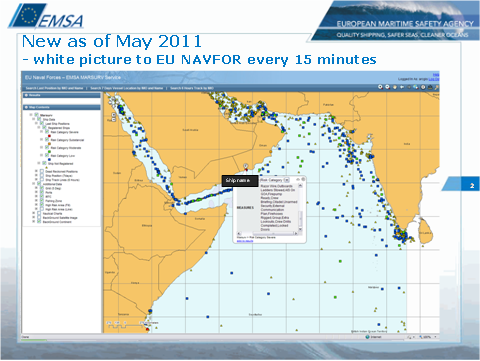EU Naval Force (EUNAVFOR) in conjunction with the European Maritime Safety Agency (EMSA) have collaborated to develop an integrated maritime monitoring service (MARSURV) to allow EUNAVFOR to track merchant vessels in the High Risk Area off the coast of Somalia.
EMSA is the technical cooperation platform of the Commission and EU Member States in the field of maritime safety. This monitoring service has been designed to fuse multiple sources of ship specific information (MSCHOA registration and UKMTO reporting information) and positional data (Long Range Information Tracking - LRIT and SATELLITE AIS) in a real time environment.
MARSURV will greatly enhance the ability of counter-piracy forces to manage and risk assess the thousands of merchant vessels transiting across this huge area. It will also assist in incident management and improve the ability to warn merchant ships in imminent danger of piracy; ultimately improving the protection from piracy provided to all merchant shipping.
In delivering this capability, EUNAVFOR would like to recognise the substantive efforts and contributions of EMSA and those of the Flag States who have provided the LRIT data of merchant vessels in the High Risk Area. The provision of this data is critical to the effectiveness of the project. Unfortunately, ships registered to flags not providing this data will not benefit from the enhanced situational awareness that such a real time picture provides to counter-piracy forces as they may be unaware of their position. EUNAVFOR and EMSA continue to work closely with the IMO whose efforts in establishing the ‘IMO Anti-Piracy LRIT Distribution Facility’ have been essential in developing this project and is the foundation on which this service has been built.
Commander of EUNAVFOR Major General Buster Howes OBE said:
“Through the commendable efforts of EMSA and the IMO, MARSURV represents a significant step forward in our ability to understand and support the massive volume of merchant traffic that transits the high risk area. The next step is to encourage all flag states to provide LRIT data to counter-piracy forces through the IMO distribution facility; currently data is donated from only 66 flag states”
EMSA is the technical cooperation platform of the Commission and EU Member States in the field of maritime safety. This monitoring service has been designed to fuse multiple sources of ship specific information (MSCHOA registration and UKMTO reporting information) and positional data (Long Range Information Tracking - LRIT and SATELLITE AIS) in a real time environment.
MARSURV will greatly enhance the ability of counter-piracy forces to manage and risk assess the thousands of merchant vessels transiting across this huge area. It will also assist in incident management and improve the ability to warn merchant ships in imminent danger of piracy; ultimately improving the protection from piracy provided to all merchant shipping.
In delivering this capability, EUNAVFOR would like to recognise the substantive efforts and contributions of EMSA and those of the Flag States who have provided the LRIT data of merchant vessels in the High Risk Area. The provision of this data is critical to the effectiveness of the project. Unfortunately, ships registered to flags not providing this data will not benefit from the enhanced situational awareness that such a real time picture provides to counter-piracy forces as they may be unaware of their position. EUNAVFOR and EMSA continue to work closely with the IMO whose efforts in establishing the ‘IMO Anti-Piracy LRIT Distribution Facility’ have been essential in developing this project and is the foundation on which this service has been built.
Commander of EUNAVFOR Major General Buster Howes OBE said:
“Through the commendable efforts of EMSA and the IMO, MARSURV represents a significant step forward in our ability to understand and support the massive volume of merchant traffic that transits the high risk area. The next step is to encourage all flag states to provide LRIT data to counter-piracy forces through the IMO distribution facility; currently data is donated from only 66 flag states”
